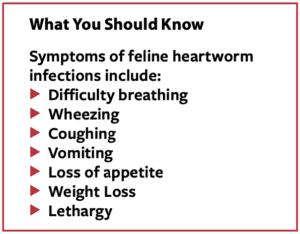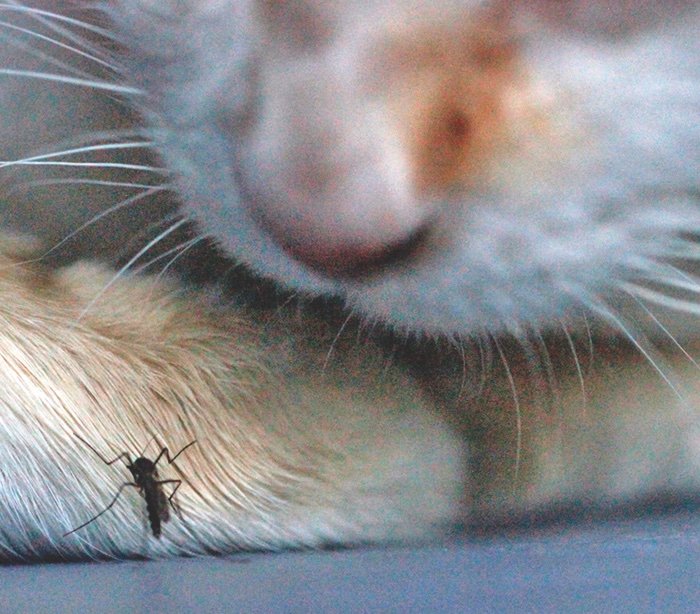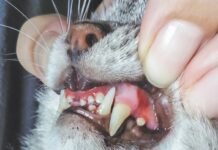While heartworm disease is largely considered a canine problem, cats are susceptible to this parasite as well. The Companion Animal Parasite Council (CAPC) estimates that feline heartworm infections occur at about 10% of the incidence rate of canine heartworm. The greatest incidence of heartworm disease is in the southeastern United States, the Mississippi River Valley, and Texas, but feline cases have been detected by positive antibody tests in all 50 states.
Cats with heartworm infections can show a wide range of clinical signs, ranging from nothing obvious to respiratory distress. When the latter is seen in cats with heartworm infections, it is referred to as Heartworm-Associated Respiratory Disease (HARD). Cats with HARD may cough, wheeze, and experience dyspnea (difficulty breathing), making it difficult to distinguish from feline asthma.
Occasional vomiting may be seen, and as the infection progresses, affected cats may stop eating, lose weight, and become lethargic.
Many feline heartworm infections consist of just one or two adult worms, but if an adult heartworm dies, affected cats may experience pulmonary thromboembolism (PTE, blockage of blood flow to the lungs) that could lead to death. Reactive inflammation in the lungs, usually called eosinophilic pneumonitis, also can significantly impact an affected cat’s ability to breathe. Heartworms in cats can migrate to unusual tissues, including the brain or eye, and may cause signs related to these organs.

An estimated 10% to 20% of cats infected with heartworms experience sudden death due to the death of adult heartworms and subsequent PTE, according to the CAPC.
Diagnosis
Cats are more resistant to heartworm infections than dogs. Microfilaremia (the presence of immature heartworms in the bloodstream) is much less common in cats than dogs. For this reason, performing both antibody tests (which test for antibodies to adult heartworms) and antigen tests (which test for adult heartworm proteins in the blood) is the best way to diagnose infections in cats. Radiographs of the chest and echocardiography can be useful to confirm a diagnosis and to evaluate the lungs.
Treatment
Heartworm treatment has improved in dogs, but there is no approved treatment for heartworm cases in cats. For most cats, supportive care, including corticosteroids to minimize immune reactions and inflammation caused by dying adult worms, is pursued. Most of the danger from feline heartworm infections comes from allergic reactions as the adult worms die.
Supportive care also may be focused on treating the respiratory signs that are common in feline heartworm cases. In emergency situations, oxygen supplementation and a bronchodilator to ease respiration may be needed in addition to the corticosteroids.
Heartworms also harbor bacteria (called Wolbachia) whose endotoxins can contribute to the clinical signs and illness seen in heartworm-infected pets. Currently, doxycycline treatment is recommended for dogs with heartworm, primarily to eliminate this common contributor to inflammation in the lungs.
Any infected cat, even if asymptomatic, should have periodic rechecks to follow the progression of the disease. This might involve repeating bloodwork and/or chest X-rays to track any changes in the lungs or heart. If your previously fine heartworm-positive cat starts coughing, she should be thoroughly checked out.
Importantly, drugs that are used to eliminate adult heartworms in dogs can be highly toxic to cats, and most cases of feline heartworm disease are ultimately self-limiting and resolve without specific efforts to eliminate adult heartworms over variable periods of time.
Prevention
Both indoor and outdoor cats are at risk of heartworm disease, since a broken screen or open door can allow a mosquito (which transmits the parasite between susceptible animals) access to the house. Any catio (screened, outside cat enclosure) should have mosquito-proof screening to keep your cat safe during mosquito season.
Parasitologists recommend preventive treatment for cats, just like for your dog. With cats, it’s wise to perform both antibody and antigen testing before beginning preventive therapy to determine the heartworm status of your cat.
The American Heartworm Society says: “Heartworm prevention can be achieved in cats with monthly doses of either ivermectin or milbemycin oxime orally, or topical moxidectin or selamectin. Preventives should be started in kittens at 8 weeks of age and be administered to all cats in heartworm-endemic areas during the heartworm transmission season.”
Many veterinarians simply suggest using a preventive all year round to encourage client compliance. As an added benefit, many of these heartworm preventatives provide additional protection against a variety of other internal and external parasites.




